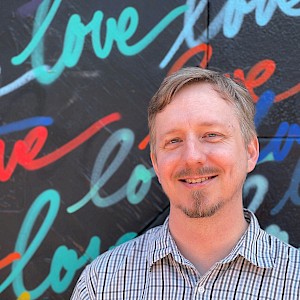Let’s Practice a Love Ethic
Overall, things have felt a bit better since my post last August. I still have plenty of times where I feel discouraged, isolated, and hopeless as our so-called leaders and institutions abandon us during an ongoing pandemic for the pursuit of profits. However, I have been trying harder to find small moments of joy. I have also been trying to focus my energy where I feel it can make more of an impact, meaning locally. I have some good moments and I feel like they’re sometimes lasting a bit longer, so overall, I consider it an improvement.
I think something that has been coming into more clarity for me is the importance of solidarity, especially with the disabled and immunocompromised. On TikTok, I have found a niche of COVID-conscious people — people who are still masking in public and advocating for layers of protection instead of pretending like everything is normal and it’s 2019 again. A common question they get asked is, “How long will you keep masking?” Several of them say: basically until the disabled and immunocompromised can feel safe to go out unmasked.
It is so easy for able-bodied people, myself included, to forget how precarious our health can be. We could be one infection away from being disabled or immunocompromised. Everything about our culture in the US pushes us to think of those people as “other.” The message seems to be: Sure, it’s unfortunate that happened to them, but it won’t happen to me. We individualize the health risk of this ongoing pandemic instead of treating it as a community health risk.
I had a really positive interaction the other week. Missiongathering (mg) has a new interim pastor, Braeden. On Instagram he shared some slides about Disability Theology, which caught my attention. I watched the corresponding sermon online and thought it was really good, but I noticed the lack of masks. I love mg even if I haven’t been there in a while, so decided to email him and humbly suggest including the ongoing pandemic in such discussions. It is important to me that a community that is being inclusive exercises communal care and unfortunately, the way things are currently, I don’t think an immunocompromised person would feel safe coming into that space. It is great that they are still offering a virtual option, but I don’t think that should be the only option when layers of protection like masking and filtering air can make in-person gatherings much safer for all.
I don’t know what type of response I expected, but I was surprised when Braeden replied and was profusely thankful. He explained it was near and dear to his heart as well since he has immunocompromised family. He and his wife are usually the only ones masking during worship and he only takes his off when preaching. We exchanged a few messages, commiserated a bit, and set up a Zoom call later in the week to discuss more and just get to know each other. We had a really good talk for about 45 minutes. I know in my head that there are other people out there still taking precautions, but it’s still really nice to actually hear “me too” from someone. I really appreciate that coming from someone in leadership, too. Today he sent me a picture of the air filtration he brought in to the mg space.
I came across a really powerful and challenging essay which I named this post after: Practicing a Love Ethic in the Ongoing Pandemic Part 1 and Part 2 by Ji-Youn Kim (21 minute read altogether; an audio version is available). There are so many things I could quote from this essay! I will try to keep the quotes limited, but please, please read or listen to them both. Emphasis below is from the original.
“Andrews et al. describe ableism as representing ‘a form of control that a nondisabled majority wields over a disabled minority to marginalize their experiences, expectations, and contributions. Ableism, then, often objectifies disabled persons for the benefit of nondisabled persons.’ (455). By denying our collectivity with disabled folks, we are objectifying them into a category with which we refuse relationality, and thus, collective responsibility. Abled supremacy renders our actions and experiences as separate through individualism, which becomes a more layered issue of racial justice, class struggle, and queer/trans liberation, as COVID-19 disproportionately impacts the poor and working class, queer and trans, Black, Indigenous, People of Colour.”
…
“To continue to practice pandemic safety despite state neglect and propaganda of post-pandemic life requires one to confront the overwhelming systemic ableism that has seeped through almost every corner of life, including so-called left spaces that claim to value social justice.”
Practicing a Love Ethic in the Ongoing Pandemic Part 1 by Ji-Youn Kim
After part 1 challenges us to confront our ableism, part 2 invites us to reimagine how we move forward. This is the type of ethic I want to strive to live out:
“I often wonder — what if we could re-member and re-embody the collective spirit that we felt in taking care of one another at the beginning of the pandemic? What if we could re-commit to collective care and collective safety by recognizing our relationalities with, and thus, our responsibilities towards one another? In this dreaming, I invite folks into the possibilities for more liberatory responses, as alternatives to the current norms of abled supremacy.”
Practicing a Love Ethic in the Ongoing Pandemic Part 2 by Ji-Youn Kim
Responses
★ Marty McGuireAdd Your Response
This is an older post, so the public comment form is now closed. You can still use the form above to send me the link of your reply or sign in with your email to leave a comment. You can always send me a message, too.

